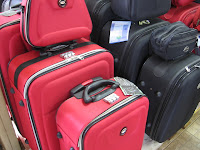 Air France has announced extension of its Saphir service
Air France has announced extension of its Saphir service, aimed at people with disabilities, to 17 additional countries, including the US, UK and Canada. Here's a summary from their press office of what carrying a Saphir card entitles you to:
- Assistance at check-in.

- Provision of a wheelchair at the airport.
- Free transport of a guide dog.
- Carriage of passenger's wheelchair free of charge in hold.
- Priority boarding when possible.
- "Personalized in-flight service."
- Assistance during the flight.
- Personal welcome upon arrival.
Holding a Saphir card also eliminates the need for passengers to have to "provide information on his or her handicap each time they book a ticket. They simply quote their Saphir card number, which they receive free of charge no matter how frequently they travel," a corporate press release says. You also do not need to have a Saphir card to receive these services.
Hey, a personal welcome upon arrival. Sweet.
But seriously folks, having your requirements pre-registered and on file seems like a good service. But doesn't much of Saphir service sound pretty standard?
(Photos courtesy of Air France)
 The Hapuna Beach Prince is pegged by this Chicago Tribune article as being "particularly wheelchair-accessible," but without any explanation of what that means. But it does sound like a lovely place. (Photo by Jim Munnelly via morgueFile.com)
The Hapuna Beach Prince is pegged by this Chicago Tribune article as being "particularly wheelchair-accessible," but without any explanation of what that means. But it does sound like a lovely place. (Photo by Jim Munnelly via morgueFile.com)



















